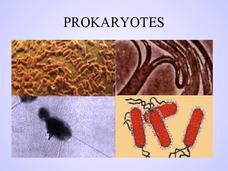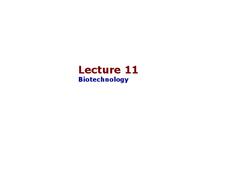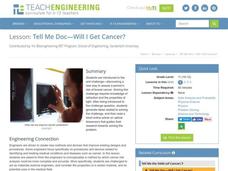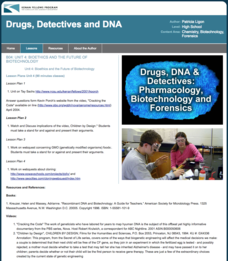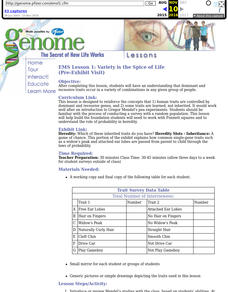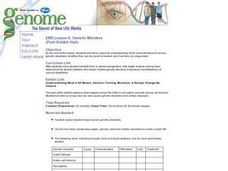National Academy of Sciences
Genetic Disease: Putting DNA to Work
Scientific knowledge of genetic information has grown quickly over the last decade. An interactive lesson has learners research the role of science and medicine in diagnosing and treating genetic disorders. They consider the job of the...
Howard Hughes Medical Institute
Central Dogma and Genetic Medicine
Scientists work every day to find solutions to genetic diseases. Scholars learn about the process of gene sequencing, mutations, and the results. They explore genetic diseases and therapies to intervene and help and, through case...
Cold Spring Harbor Laboratory
Higher Cells Incorporate an Ancient Chromosome
Chromosomes contain keys to history including links from royalty to Neanderthals. Young scientists learn about Ivan Wallin's research into chromosomes with an animation and videos. Then, the concept connects to mysteries related to...
Curated OER
Jurassic Park: The Science and Ethics of Genetic Engineering
Explore genetic engineering through an engaging "Jurassic Park" unit, which is an extensive use of a cross-curricular teaching event. Planned for AP Biology, English, and Calculus young scholars, learners and teachers are involved for...
Curated OER
Prokaryotes
The cellular and genetic organization of Prokaryotes, and the main characteristics of their movement and structure are summarized in this presentation. They are compared to Eukaryotes and that information will help your students...
Curated OER
Biotechnology
The metaphors used here to describe the "cut and paste" procedures for genetic engineering will really help your biologists in their understanding of restriction enzymes and DNA. The uses of genes that are isolated and incorporated...
Curated OER
7.012 F’04 Problem Set 1 ~ Biology
Course identification information is included in the upper left corner as well as within the title of this worksheet. If you overlook or remove that information, you are left with a tremendous college biology assignment. There are only...
Curated OER
Human Cloning: Is it Biological Plagiarism?
Is cloning good or harmful? Help your class understand the risks and benefits as they read, research, and discuss human cloning. Individuals form teams, research information, and present to the class before concluding with an in-depth...
Teach Engineering
Tell Me Doc—Will I Get Cancer?
Can you beat the odds of cancer? In the first installment of a seven-part series, future biomedical engineers consider how to detect and diagnose cancer. An article on biosensors provides useful information toward this goal.
Virginia Department of Education
Biotechnological Issues and Bioethics
Culminate a bioethics unit with the implementation of a lesson that incorporates the Socratic method to encourage class feedback and participation. Pupils participate in a discussion on bioethics and morality, complete a...
Agriculture in the Classroom
Farmland: GMOs and Organic Agriculture
Learn more about genetic modification, organic farming, and the role of biotechnology in agriculture by watching a documentary that shows how newly gained knowledge can be applied to specific situations involving farmers and the choices...
American Museum of Natural History
The Tree of Life
Groups of species can have more in common than meets the eye. An interactive cladogram shows some of the connections between important groups of species. Learners click on sections of the diagram to learn more about the connections or on...
Curated OER
Human Origins: The Prehistoric Human Race
When it comes to the origin of the human species young scholars are full of misconceptions. Clear up the hominid confusion with this evolutionary activity focused on assisting students in understanding prehistoric man and his family...
Howard Hughes Medical Institute
Winogradsky Columns: Microbial Ecology in the Classroom
Winogradsky columns are ideal for observing the role of bacteria and other microorganisms in an ecosystem. This student activity guide is complete with data tables for observations and analysis questions for processing what was observed....
Howard Hughes Medical Institute
DNA Profiling Activity
Everyone loves a good mystery ... can your class actually solve one? Partnered pupils take on the role of forensic investigators during a three-part activity focusing on DNA evidence processing. Learners discover the methods used to...
National Nanotechnology Infrastructure Network
Help or Hype: The Ethics of Bio-Nanotechnology
Ethical concerns are not always black and white. A well-designed lesson presents learners with scenarios for which ethics may come into question. Scholars learn to consider the different sides of a situation and make an unbiased...
Howard Hughes Medical Institute
Viral DNA Integration
How do reverse transcriptase inhibitors work? Young virologists examine the function of azidothymidine, a drug doctors use to treat HIV patients, during a hands-on modeling activity. Groups create a strand of DNA from an HIV RNA strand...
Kenan Fellows
Unit 4: Bioethics and the Future of Biotechnology
What's the future of biotechnology? Explore a hot topic in the fourth and final unit in a series of Biotechnology lessons. Learners develop an understanding of the many issues in bioethics, then create an argument for or against the role...
Curated OER
Disproving the Proof
Learners investigate the progression of discoveries that have led to the genetics knowledge that scientists currently have. They determine how genetic experiments disproved previous theories on inheritance.
Curated OER
EMS Lesson 2: Outrageous Offspring
Pupils investigate the principles of probability that can be used to predict hereditary traits.
Curated OER
EMS Lesson 1: Variety is the Spice of Life
Students discern that dominant and recessive traits occur in a variety of combinations in any given group of people.
Curated OER
Variety is the Spice of Life
Students explore Gregor Mendel's work with genetics. They complete a survey of their friends and family in order to identify dominant and recessive traits. Once their surveys are complete, students discuss the ways in which dominant...
Curated OER
Genetic Mistakes
High schoolers explore genetic disorders. They examine the genetic structure to physicial manifestations of various disabilities. Using internet sources, students analyze the characteristics of genetic disorders, whether they can be...
Curated OER
Cell City
Young scholars understand how various cell parts function and how they are related to the genetic process by creating a model and symbol to depict the function of the cell parts. They research a cell part to determine function and then...
Other popular searches
- Human Genome Project
- Genome Projects
- Human Genomes
- Genome Chromosomes
- The Human Genome Project
- Human Genome Project. Dna
- Human Genome Lesson Plan
- Biology the Human Genome
- Biology Human Genome
- Genome and Society
- Genome Analysis
- Length Cm Human Genome




